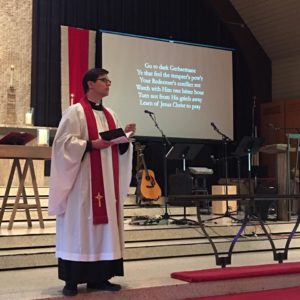Coaching: A Help to Get Unstuck
AMIA Communications
 (August 2017) A few years into his Worship Director and Assistant Pastor role at All Saints Dallas, Father Jay Wright found himself feeling stuck.
(August 2017) A few years into his Worship Director and Assistant Pastor role at All Saints Dallas, Father Jay Wright found himself feeling stuck.
“I felt stuck in a particular leadership situation,” Jay+ explained. “I initially talked to my rector, Bishop Philip Jones, about it. In the course of our conversation, he helped me see that in the particular situation I was in, I really needed to talk to a third party who wasn’t on the ground with me and would have a different perspective.”
Bishop Jones encouraged Jay to call Terry Walling, President of Leader Breakthru and a coach to many in ministry.
“Our conversation was unbelievable,” Jay said. “I walked away with clarity on the situation and many of the things that Terry and I talked about bore fruit down the line.”
It would not be the last time that coaching has impacted Wright’s life and ministry. Jay has regularly scheduled calls with his Church plant coach, Allen+ Hughes. We recently Jay to learn what coaching looks like and why it is something he continues to pursue.
When were you first exposed to coaching in a ministry context?
In 2010, my wife Amy and I went to an Anglican Mission Network Retreat. The retreat was run by Allen+ Hughes, AMiA’s Counselor General for Leadership, and Terry Walling, Founder and President of Leader Breakthru. We worked through the Leader Breakthru Focused Living curriculum, including a timeline exercise, where you look at key moments in your life where God has spoken, where there has been pain, and where revelation has occurred all to see how God is shaping and forming you.
I was an aspirant to holy orders at the time and a worship leader trying to make sense of my life. I knew I wanted to serve the church but I didn’t know what that would look like. Together, Amy and I were able to recognize our values as a family and our values for ministry. We got certain clarity that weekend that lead us to move back to Texas.
Thankfully, it has been a pattern in my life that God will put people in my path who invest in me. People who are willing to invest their time in seeing me and other leaders develop. So when I came across the opportunity to receive coaching in ministry, that seemed like a logical next step.
Why did you pursue being coached?
I knew that I needed someone else to walk alongside me and to draw out of me the things that God has put there. I can’t do that on my own, I have to walk with others to do that. I’m an adult and a leader in God’s church. I need coaching to personally fulfill God’s call and vision for my life. I’d be missing an opportunity if I didn’t do this.
I want to do well. I want my life and ministry to count. I want God’s vision to be realized and actualized and that takes effort and work. With coaching there is a level of accountability and concrete steps. Allen+ and others in the AMiA have made sacrifices for people like me. I want to honor that and be faithful with what they and God have entrusted to me.
What does coaching look like?
Allen became my coach through the church plant assessment and certification process and continues to coach me now, almost two years into launching weekly services for All Saints East Dallas. I’ve known Allen for a long time. He is very practical and concrete, which is great, because I’m more abstract.
Allen and I have scheduled coaching appointments twice a month, each one for about an hour. As a coachee, I bring specific goals and outcomes in mind. Our talks aren’t off the cuff, they are scheduled and clear. We both come prepared and ready to tackle issues of ministry and personal growth.
Lately, our coaching appointments have been around the specifics of leading a church plant. I’ll tell Allen+ what’s going on and he’ll speak into it. He is helping guide the very concrete process of taking All Saints East Dallas from a growing church plant to a self-sustaining community.
Can you give us an example of a topic you tackled together?
In May, our coaching was about discerning my approach to summer, looking at my philosophical view of it and the practical ways of organizing it. Some churches ramp up in the summer and some slow down. Allen+ helped me come up with an organizing statement, all the while keeping at the forefront the question “how is it making disciples?”
As a result, All Saints East Dallas’s organizing statement for the summer was: we are slowing down to focus on relationships. From this organizing statement, we were able to fill in the blanks for summer programming. We are focusing on our relationship with God through special worship nights throughout the summer, and on our relationships with each other through special social events.
You’ve been a coachee for years, do you also coach others?
Yes. In 2012, All Saints Dallas led a Leader Breakthru University certification course where I became a certified coach.
I am currently coaching two people who are aspirants to holy orders. I love coaching others, getting to connect with them and discover where God has been at work in their life. I also find that I get more out of my own coaching because I know what is going into coaching on the coach’s side.
What are your least and most favorite parts of being coached?
My least favorite part, at least initially, is when facing the pain of life: sickness, disease and grief. In coaching you have to face the pain, but that is a gift! If you don’t face it, there is no healing.
As for my favorite part, a specific conversation comes to mind where I was pretty mired in distracting things. Allen+ redirected me to the actual work of ministry. In the course of that conversation I remembered why I love ministry. It was pretty awesome, and helped get me back on track and excited about the things the Lord was doing.
If you are interested in coaching, please contact our Rector General, Mike Blanchat, at mike@theamia.org or our Counselor General for Leadership, Allen Hughes, at allen@theamia.org.











